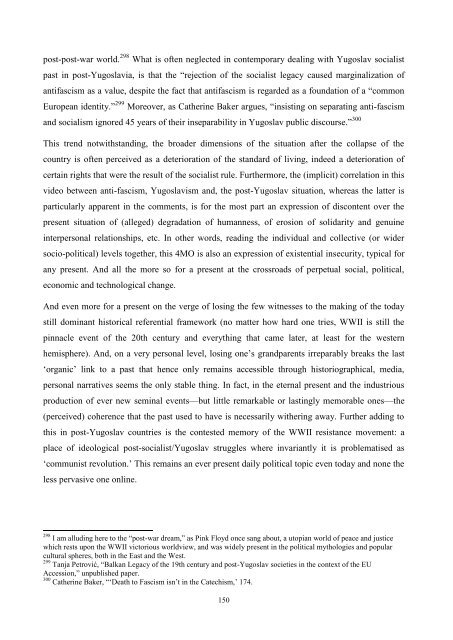UNIVERSITY OF NOVA GORICA GRADUATE SCHOOL ...
UNIVERSITY OF NOVA GORICA GRADUATE SCHOOL ...
UNIVERSITY OF NOVA GORICA GRADUATE SCHOOL ...
Create successful ePaper yourself
Turn your PDF publications into a flip-book with our unique Google optimized e-Paper software.
post-post-war world. 298 What is often neglected in contemporary dealing with Yugoslav socialist<br />
past in post-Yugoslavia, is that the ―rejection of the socialist legacy caused marginalization of<br />
antifascism as a value, despite the fact that antifascism is regarded as a foundation of a ―common<br />
European identity.‖ 299 Moreover, as Catherine Baker argues, ―insisting on separating anti-fascism<br />
and socialism ignored 45 years of their inseparability in Yugoslav public discourse.‖ 300<br />
This trend notwithstanding, the broader dimensions of the situation after the collapse of the<br />
country is often perceived as a deterioration of the standard of living, indeed a deterioration of<br />
certain rights that were the result of the socialist rule. Furthermore, the (implicit) correlation in this<br />
video between anti-fascism, Yugoslavism and, the post-Yugoslav situation, whereas the latter is<br />
particularly apparent in the comments, is for the most part an expression of discontent over the<br />
present situation of (alleged) degradation of humanness, of erosion of solidarity and genuine<br />
interpersonal relationships, etc. In other words, reading the individual and collective (or wider<br />
socio-political) levels together, this 4MO is also an expression of existential insecurity, typical for<br />
any present. And all the more so for a present at the crossroads of perpetual social, political,<br />
economic and technological change.<br />
And even more for a present on the verge of losing the few witnesses to the making of the today<br />
still dominant historical referential framework (no matter how hard one tries, WWII is still the<br />
pinnacle event of the 20th century and everything that came later, at least for the western<br />
hemisphere). And, on a very personal level, losing one‘s grandparents irreparably breaks the last<br />
‗organic‘ link to a past that hence only remains accessible through historiographical, media,<br />
personal narratives seems the only stable thing. In fact, in the eternal present and the industrious<br />
production of ever new seminal events—but little remarkable or lastingly memorable ones—the<br />
(perceived) coherence that the past used to have is necessarily withering away. Further adding to<br />
this in post-Yugoslav countries is the contested memory of the WWII resistance movement: a<br />
place of ideological post-socialist/Yugoslav struggles where invariantly it is problematised as<br />
‗communist revolution.‘ This remains an ever present daily political topic even today and none the<br />
less pervasive one online.<br />
298 I am alluding here to the ―post-war dream,‖ as Pink Floyd once sang about, a utopian world of peace and justice<br />
which rests upon the WWII victorious worldview, and was widely present in the political mythologies and popular<br />
cultural spheres, both in the East and the West.<br />
299 Tanja Petrović, ―Balkan Legacy of the 19th century and post-Yugoslav societies in the context of the EU<br />
Accession,‖ unpublished paper.<br />
300 Catherine Baker, ―‗Death to Fascism isn‘t in the Catechism,‘ 174.<br />
150

















